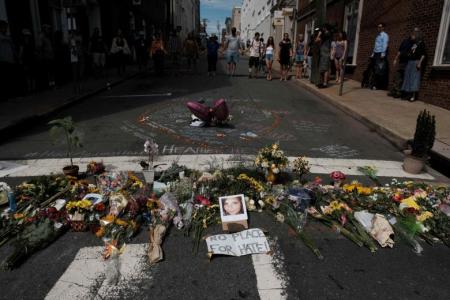'There Is No Neutral Ground Here,' Erwin McManus Says to the Church (Interview)

On Saturday, in the middle of the chaos in Charlottesville, Virginia, that began the night before, Erwin McManus, author and pastor at Mosaic in Los Angeles tweeted, "We cannot unite with hate. We must stand against it. You cannot reason with racism. You must condemn it. The church must lead the way. NOW!"
His post came after a relatively long thread of tweets that condemned the evil and called out the Church in America to unite in "peace, justice, and hope."
Below is McManus' answers to seven questions asked while the nation was and still is processing what happened in Charlottesville and the ongoing reactions across the United States.
Describe your initial reaction to the events that transpired in Charlottesville.
Erwin McManus: It was probably a combination of disgust, disappointment, and hopefulness.
Disgust because there should be no room for movements of hate such as white supremacy and Nazism. It's astonishing that people can be so ignorant, fearful, and filled with hate.
Disappointed because I love this country and expect better from us. The undercurrent and subculture of racism and white supremacy have always been here but now they have been emboldened to go public as they feel their views have been validated and normalized.
Hopeful in that this is not a new problem in our society and it has been allowed to thrive in the darkness of denial and silence by the white majority and unjust legal system. Their boldness to go public has brought them to the light and the darkness cannot prevail over the light. I am convinced most Americans — yes even white Americans — are committed to justice and equality for all people. I am convinced that most Americans are disgusted and even ashamed that Nazism is alive and well in this country that fought to defeat its evil ideology.
Your call for the Church to respond "NOW!" as you posted on Twitter obviously reflects urgency. Why?
McManus: It is inescapable that the evangelical church is seen as married to the present administration in Washington. Silence in this moment would be perceived as agreement and adherence to white supremacist ideologies.
There is no neutral ground here. You either speak against racism or you add credence to their views. I am convinced the Church is the greatest hope for humanity and for creating a new world where everyone is valued and embraced regardless of differences.
This is a critical moment in history and I want the Church on record and on the right side of history.
How should the Church respond?
McManus: As they have all weekend after Charlottesville. They must openly, emphatically, and clearly denounce White Supremacy and any ideology associated with Nazism.
Then we need to advocate for social justice and reform so that all minorities are protected not only under the law but more importantly by our cultural values and ethic. The law cannot change the human heart. Government is limited in its ability to effect culture. This is the role and responsibility of the Church. Only Jesus can move us from hate to love.
What do you see happening in Los Angeles in regards to Church unity? Are they getting together? How?
McManus: The Church is not segregated by region or cities. That's an antiquated view of the world. We are united with churches all over the world working toward common goals based on shared values. Mosaic is one of the most racially diverse churches on the planet. Our community and extended Church family is global and completely integrated.
What are the ramifications of Charlottesville for the Church as you see it?
McManus: Perhaps the most significant ramification for many churches is that if your church is racially homogenous it will be essentially irrelevant. The future belongs to those who have the courage to create it. We need a new humanity. We need a new expression of community. We need the Church to bring the world together. This makes me excited. There is so much opportunity here. I'm grateful that Mosaic began creating the new expression of the Church over 20 years ago. We are not reacting to a crisis. We are acting on a conviction and a calling.
Is there something in your new book, The Last Arrow, that ties into how you feel today about current events?
McManus: The Last Arrow transcends a moment or an issue. It is a call to move beyond self-indulgence to a life of sacrificial service. In The Last Arrow I address a broad spectrum of issues from the Syrian refugee crisis to the cultural epidemic of depression to the personal struggle of insignificance. The Last Arrow is a clarion call to make a difference in the world rather than a self-help book for personal self-improvement.
Is there anything else you would like to add?
McManus: Racists are not born, they are raised. Isolation is the breeding ground for racism. The more you come to know the world around you and people different than you the less likely you will become an extremist. The Church needs to bring the world together.
As a speaker, I can inspire people to change but as a writer I can guide people to change. That's why books are so important. As a pastor, though, I can be a part of creating the change the world so desperately needs.
For me, that change the world so desperately needs is called Mosaic.
This article was originally published at TogetherLA.net.





















